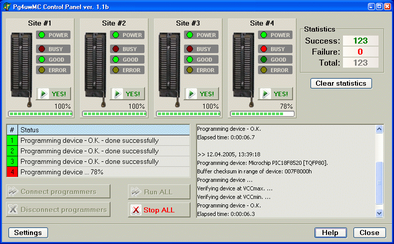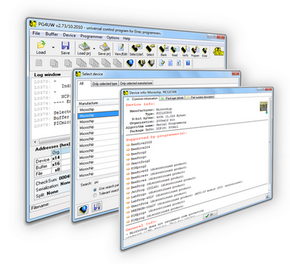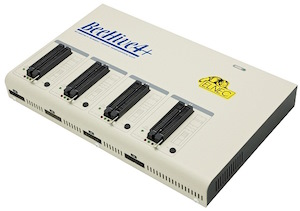BeeHive4+
Discontinued product. Replacement: BeeHive204.
Extremely fast universal 4x 48-pindrive concurrent multiprogramming system.
Short description:
- Four independent universal programming modules (BeeProg+ based) in one unit
- two BeeHive4+ multiprogrammers can be attached to one PC to better utilize programming workplace
- extremely fast programming, one of the fastest programmers in this category. Programs 64Mbit NOR Flash memory less than 46 seconds and 1Gbit NAND Flash less than 120 sec.
- powerful independent pin driver circuit for each and every pin of the programmer
- in-circuit programming capability through ISP connector
- Very low voltage support for latest Flash memory chips
- ESD protection on each pin of the sockets
- no adapter required for any DIL devices
- USB (up to 480 Mbit/s) interface to PC
- comfortable and easy to use control program, works with all versions of MS Windows from Windows XP to Windows 11 (32-bit and 64-bit) running at x86/x64 compatible PC
- made in Slovakia
- warranty - 3 years
Optional accessories:
Features
General
- BeeHive4+ is extremely fast universal 4x 48-pindrive concurrent multiprogramming system designed for high volume production programming with minimal operator effort. The chips are programmed at near theoretical maximum programming speed.
- BeeHive4+ consists of four independent isolated universal programming modules, based on the BeeProg+ programmer hardware. Therefore the sockets can run asynchronously (concurrent programming mode). Each programming module starts programming at the moment the chip is detected to be inserted in the socket properly - independently on the status of other programming modules. It result three programming modules works while you replace the programmed chip at the fourth.
- Modular construction of hardware - the programming modules works independently - allows for continuing operation when a part of the circuit becomes inoperable. It also makes service quick and easy.
- Hands-free operation: asynchronous and concurrent operation allows a chip to begin programming immediately upon insertion of a chip. The operator merely removes the finished chip and inserts a new chip. Operator training is therefore minimized.
- Supports all kinds of types and silicon technologies of today and tomorrow programmable devices without family-specific module. You can be sure the next devices support require the software update and (if necessary) simple package convertor (programming adapter), therefore the ownership cost are minimized.
- Using built-in in-circuit serial programming (ISP) connector, the programmer is able to program ISP capable chips in circuit.
- Provides very competitive price coupled with excellent hardware design for reliable programming. Probably best "value for money" programmer in this class.
- Very fast programming due to high-speed FPGA driven hardware and execution of time-critical routines inside of the programmer. At least fast than competitors in this category, for many chips much faster than most competitors. As a result, when used in production this programmer waits for an operator, and not the other way round.
- BeeHive4+ interfaces with the IBM PC compatible, portable or desktop personal computers through USB (2.0) port.
- Banana jack for ESD wrist straps connection to easy-to-implement the ESD protection control.
HARDWARE (valid for each programming module)
- FPGA based totally reconfigurable 48 powerful TTL pindrivers provide H/L/pull_up/pull_down and read capability for each pin of socket. Advanced pindrivers incorporate high-quality high-speed circuitry to deliver signals without overshoot or ground bounce for all supported devices. Pin drivers operate down to 1.8V so you'll be ready to program the full range of today's advanced low-voltage devices.
- Each programming module performs device insertion test (wrong or backward position) and contact check (poor contact pin-to-socket) before it programs each device. These capabilities, supported by overcurrent protection and signature-byte check help prevent chip damage due to operator error.
- The selftest capability allow to run diagnostic part of software to thoroughly check the health of the each programming module.
- Built-in protection circuits eliminate damage of the programming module and/or programmed device due to environment or operator failure. All ZIF socket pins inputs and all pins of ISP conncetor of BeeHive4+ programmer are protected against ESD up to 15kV.
- BeeHive4+ programmer performs programming verification at the marginal level of supply voltage, which, obviously, improves programming yield, and guarantees long data retention.
- Various programming adapters are available to handle device in PLCC, SOIC, PSOP, SSOP, TSOP, TSSOP, TQFP, QFN (MLF), SDIP, BGA and other packages.
SOFTWARE (production mode control)
- This part of the software is focused to the easy monitoring of high-volume production operations.
- Operator-friendly control software combines many powerful functions with ease of use. Graphic user interface provide overview of all important activities result without burden of operator with non-important details.

- There is used a project file to control the BeeHive4+ multiprogramming system. Project file contains user data, chip programming setup information, chip configuration data, auto programming command sequence, etc. Therefore the operator error is minimized, because the project file is normally created and proofed by engineering and then given to the operator. The optional protected mode can be set for project file to avoid a unwanted changes of the project file.
- Each chip may be programmed with different data such as serial number, configuration and calibration information.
SOFTWARE (programming modules driver, engineering mode control)
- This part of the software is focused to the quick and easy preparation of the project file for usage in the production mode control software.
- Each programming module is driven by an easy-to-use control program with pull-down menu, hot keys and on-line help. Selecting of device is performed by its class, by manufacturer or simply by typing a fragment of vendor name and/or part number. It is the same years-proven software, as is used for all other Elnec single-site programmers.

- Standard device-related commands (read, blank check, program, verify, erase) are boosted by some test functions (insertion test, connection check, signature-byte check), and some special functions (autoincrement, production mode - start immediately after insertion of chip into socket).
- All known data formats are supported. Automatic file format detection and conversion during loading of file. There is possible to use Jam files (JEDEC standard JESD-71) and VME files
- The rich-featured auto-increment function enables one to assign individual serial numbers to each programmed device - or simply increments a serial number, or the function enables one to read serial numbers or any programmed device identification signatures from a file.
- The software also provide a many information about programmed device. As a special, the drawings of all available packages are provided. The software provide also explanation of chip labelling (the meaning of prefixes and suffixes at the chips) for each supported chip.
Care for the customers
- It is important to remember, that a support of most of the new devices requires only a software update, because the BeeHive4+ is based on the truly universal (BeeProg-like) programmer. With our prompt service you can have new device added to the list of supported devices within hours! See AlgOR (Algorithm On Request) service for details.
- Free software updates are available by download from our WEB site.
- Keep-Current and AlgOR services, our next step towards customer satisfaction.
- Keep-Current service means, that Elnec ships the latest version of programmer software and updated user documentation (Keep-Current package) to customer . The Keep-Current service is your hassle-free guarantee that you achieving the highest quality programming on Elnec programmers, at minimal cost.
- AlgOR (Algorithm On Request) service gives the user a tool to influence amount and types of programmed devices as needed.
- Advanced design of the BeeHive4+ multiprogrammer, including protective circuits, original brand components, and careful manufacturing and hours-long burning-in allows us to provide a three-year warranty on parts and labor for the programmer (limited 25 000-cycle warranty on ZIF sockets).
- Free Technical support
- Elnec provide customers technical support (WebForm/e-mail based) available usually within a few hours, or at the latest, the next working day.
Hardware specification
Specification (BeeHive4+ multiprogramming system)
- 4x universal programming module (4x 48-pin DIL ZIF sockets)
- operation result LEDs, LED power
- USB 2.0 high-speed compatible port
- line power input 100-240VAC/60W max.
- banana jack for ESD wrist straps connection
- banana jack for connection to ground
Valid for each programming module
Base unit, DACs
- USB 2.0 high-speed compatible port, up to 480 Mbit/s transfer rate
- on-board intelligence: powerful microprocessor and FPGA based state machine
- three D/A converters for VCCP, VPP1, and VPP2, controllable rise and fall time
- VCCP range 0..8V/1A
- VPP1, VPP2 range 0..26V/1A
- selftest capability
ZIF sockets, pindriver
- 48-pin DIL ZIF (Zero Insertion Force) socket accepts both 300/600 mil devices up to 48-pin
- pindrivers: 48 universal
- VCCP/VPP1/VPP2 can be connected to each pin
- perfect ground for each pin
- FPGA based TTL driver provides H, L, CLK, pull-up, pull-down on all pindriver pins
- analog pindriver output level selectable from 1.8 V up to 26V
- current limitation, overcurrent shutdown, power failure shutdown
- ESD protection on each pin of socket (IEC1000-4-2: 15kV air, 8kV contact)
- continuity test: each pin is tested before every programming operation
ISP connector
- 20-pin male type with missinsertion lock
- 6 TTL pindrivers, provides H, L, CLK, pull-up, pull-down; level H selectable from 1.8V up to 5V to handle all (low-voltage including) devices.
- 1x VCCP voltage (range 2V..7V/100mA), can be applied to pins 1, 3
- programmed chip voltage (VCCP) with both source/sink capability and voltage sense
- 1x VPP voltage (range 2V..25V/50mA), can be applied to pins 2,3,4,6,8,10
- target system supply voltage (range 2V..6V/250mA)
- ESD protection on each pin of ISP connector (IEC1000-4-2: 15kV air, 8kV contact)
Software
- Algorithms: only manufacturer approved or certified algorithms are used.
- Algorithm updates: software updates are available regularly, approx. every 4 weeks, free of charge (Internet download). OnDemand version of software is available for highly needed chips support and/or bugs fixes. Available nearly daily.
- Main features: revision history, session logging, on-line help, device and algorithm information.
Device operations
- standard:
- intelligent device selection by device type, manufacturer or typed fragment of part name
- automatic ID-based selection of EPROM/Flash EPROM
- blank check, read, verify
- program
- erase
- configuration and security bit program
- illegal bit test
- checksum
- interprete the Jam Standard Test and Programming Language (STAPL), JEDEC standard JESD-71
- interprete the VME files compressed binary variation of SVF files
- security:
- insertion test, reverse insertion check
- contact check
- ID byte check
- special:
- production mode (automatic start immediately after device insertion)
- lot of serialization modes (more type of incremental modes, from-file mode, custom generator mode)
- statistic
- count-down mode
Buffer operations
- view/edit, find/replace
- fill/copy, move, byte swap, word/dword split
- checksum (byte, word)
File load/save
- no download time because programmer is PC controlled
- automatic file type identification/recognition
Supported file formats- unformatted (raw) binary
- HEX: Intel, Intel EXT, Motorola S-record, MOS, Exormax, Tektronix, ASCII-SPACE-HEX, ASCII HEX, Renesas Consolidated HEX
- Altera POF, JEDEC (ver. 3.0.A), eg. from ABEL, CUPL, PALASM, TANGO PLD, OrCAD PLD, PLD Designer ISDATA, etc.
- JAM (JEDEC STAPL Format), JBC (Jam STAPL Byte Code), STAPL (STAPL File) JEDEC standard JESD-71
- VME (ispVME file VME2.0/VME3.0)
Device support
Programmer, in ZIF socket:
- EPROM: NMOS/CMOS, 2708*, 27xxx and 27Cxxx series, with 8/16 bit data width, full support for LV series
- EEPROM: NMOS/CMOS, 28xxx, 28Cxxx, 27EExxx series, with 8/16 bit data width
- Flash EPROM: 28Fxxx, 29Cxxx, 29Fxxx, 29BVxxx, 29LVxxx, 29Wxxx, 49Fxxx series, Samsung's K8Fxxxx, K8Cxxxx, K8Sxxxx, K8Pxxxx series, from 256Kbit to 1Gbit, with 8/16 bit data width, full support for LV series
- Serial E(E)PROM: 11LCxxx, 24Cxxx, 24Fxxx, 25Cxxx, 45Dxxx, 59Cxxx, 25Fxxx, 25Bxxx, 25Dxxx, 25Pxxx, 25Qxxx, 85xxx, 93Cxxx, NVM3060, MDAxxx series, full support for LV series, AT88SCxxx
- Configuration (EE)PROM: XCFxxx, XC17xxxx, XC18Vxxx, EPCxxx, AT17xxx, 37LVxx
- 1-Wire E(E)PROM: DS1xxx, DS2xxx
- PROM: AMD, Harris, National, Philips/Signetics, Tesla, TI
- NV RAM: Dallas DSxxx, SGS/Inmos MKxxx, SIMTEK STKxxx, XICOR 2xxx, ZMD U63x series
- PLD: Altera: MAX 3000A, MAX 7000A, MAX 7000B, MAX 7000S, MAX7000AE, MAX II
- PLD: Lattice: ispGAL22V10x, ispLSI1xxx, ispLSI1xxxEA, ispLSI2xxx, ispLSI2xxxA, ispLSI2xxxE, ispLSI2xxxV, ispLSI2xxxVE, ispLSI2xxxVL, LC4xxxB/C/V/ZC, M4-xx/xx, M4A3-xx/xx, M4A5-xx/xx, M4LV-xx/xx, ispCLOCK, Power Manager
- PLD: Xilinx: XC9500, XC9500XL, XC9500XV, CoolRunner XPLA3, CoolRunner-II
- other PLD: SPLD/CPLD series: AMI, Atmel, AMD-Vantis, Gould, Cypress, ICT, Lattice, NS, Philips, STM, VLSI, TI
- FPGA: Actel: ProASIC3, IGLOO, Fusion
- FPGA: Lattice: MachXO, LatticeXP, ispXPGA
- FPGA: Xilinx: Spartan-3AN
- NAND FLASH: Samsung K9xxx, Hynix HY27xxx, Toshiba TC58xxx, Micron MT29Fxxx, Spansion S30Mxxx, Numonyx (ex STM (ex SGS Thomson)) NANDxxx
- Multi-chip devices: NAND+RAM, NOR+RAM, NOR+NOR+RAM, NAND+NOR+RAM
- Clocks: TI(TMS), Cypress
- Microcontrollers 48 series: 87x41, 87x42, 87x48, 87x49, 87x50 series
- Microcontrollers 51 series: 87xx, 87Cxxx, 87LVxx, 89Cxxx, 89Sxxx, 89LVxxx, 89LSxxx, 89LPxxx, 89Exxx, 89Lxxx, all manufacturers, Philips LPC series
- Microcontrollers Intel 196 series: 87C196 KB/KC/KD/KT/KR/...
- Microcontrollers Atmel ARM7: AT91SAM7Sxx, AT91SAM7Lxx, AT91SAM7Xxx, AT91SAM7XCxx, AT91SAM7SExx series
- Microcontrollers Atmel AVR 8bit: AT90Sxxxx, AT90pwm, AT90can, AT90usb, ATtiny, ATmega series
- Microcontrollers Atmel AVR32: AT32UC3xxxx
- Microcontrollers Chipcon (TI): CC11xx, CC24xx, CC25xx series
- Microcontrollers Cypress: CY7Cxxxxx, CY8Cxxxxx
- Microcontrollers ELAN: EM78Pxxx
- Microcontrollers Infineon(Siemens): XC800, C500, XC166, C166 series
- Microcontrollers MDT 1xxx and 2xxx series
- Microcontrollers Microchip PICmicro: PIC10xxx, PIC12xxx, PIC16xxx, PIC17Cxxx, PIC18xxx, PIC24xxx, dsPIC series
- Microcontrollers Motorola/Freescale: 68HC05, 68HC08, 68HC11, HCS08, HCS12, MC56F, MCF52 series
- Microcontrollers Myson MTV2xx, 3xx, 4xx and 5xx series
- Microcontrollers National: COP8xxx series
- Microcontrollers NEC: uPD70Fxxx, uPD78Fxxx series
- Microcontrollers Novatek: NT68xxx series
- Microcontrollers Philips (NXP) UOC series: UOCIII, UOC-TOP, UOC-Fighter series
- Microcontrollers Philips (NXP) ARM7: LPC2xxx, PCD807xx, SAF7780xxx series
- Microcontrollers Scenix (Ubicom): SXxxx series
- Microcontrollers Renesas: R8C/Tiny series
- Microcontrollers SGS-Thomson: ST6xx, ST7xx, ST10xx, STR7xx series
- Microcontrollers & Programmable System Memory STMicroelectronics: uPSD, PSD series
- Microcontrollers STM (ex SGS Thomson): ST6xx, ST7xx, ST10xx, STR7xx, STR9xx, STM32Fxx series
- Microcontrollers Silicon Laboratories(Cygnal): C8051 series
- Microcontrollers TI: MSP430, MSC12xx series, TMS320F
- Microcontrollers ZILOG: Z86/Z89xxx and Z8Fxxxx, Z8FMCxxxxx, Z16Fxxxx, ZGP323xxxxxx, ZLF645xxxxxxx, ZLP12840xxxxx, ZLP323xxxxxxx series
- Microcontrollers other: EM Microelectronic, Fujitsu, Goal Semiconductor, Hitachi, Holtek, Princeton, Macronix, Winbond, Samsung, Toshiba, Mitsubishi, Realtek, M-Square, ASP, Coreriver, Gencore, EXODUS Microelectronic, Megawin, Syntek, Topro, TinyARM, VersaChips, SunplusIT ...
Programmer, through ISP connector:
- Serial E(E)PROM: IIC series, MW series, SPI series, KEELOQ series, serial data Flash, PLD configuration memories, UNI/O series
- Microcontrollers Atmel: AT89Sxxx, AT90pwm, AT90can, AT90usb, AT90Sxxxx, ATtiny, ATmega, AT89LSxxx, AT89LPxxx
- Microcontrollers Atmel AVR32: AT32UC3xxxx
- Microcontrollers Chipcon (TI): CC11xx, CC24xx, CC25xx series
- Microcontrollers Cypress: CY8C2xxxx
- Microcontrollers Elan: EM78Pxxx, EM6xxx series
- Microcontrollers EM Microelectronic: 4 and 8 bit series
- Microcontrollers Microchip PICmicro: PIC10xxx, PIC12xxx, PIC16xxx, PIC17xxx, PIC18xxx, PIC24xxx, dsPIC series
- Microcontrollers Mitsubishi: M16C
- Microcontrollers Motorola/Freescale: 68HC11, 68HC08 (both 5-wire, All-wire), HCS08, HCS12 series
- Microcontrollers NEC: uPD7xxx series
- Microcontrollers Philips: LPC2xxx series, LPC series, 89xxx series
- Microcontrollers Renesas: R8C/Tiny series
- Microcontrollers Realtek, M-Square
- Microcontrollers Scenix (Ubicom): SXxxx series
- Microcontrollers STM (ex. SGS Thomson): STR7xx, STR9xx, STM32Fxx series
- Microcontrollers Silicon Laboratories(Cygnal): C8051 series
- Microcontrollers & Programmable System Memory STMicroelectronics: uPSD, PSD series
- Microcontrollers TI: MSP430 (both JTAG and BSL series), MSC12xxx series
- Microcontrollers ZILOG: Z8Fxxxx, Z8FMCxxxxx, Z16Fxxxx series
- Various PLD (also by Jam/VME/SVF/STAPL/... Player/JTAG support):
- Altera: MAX 3000A, MAX 7000A, MAX 7000B, MAX 7000S, MAX 9000, MAX II
- Xilinx: XC9500, XC9500XL, XC9500XV, CoolRunner XPLA3, CoolRunner-II
- PLD: Lattice: ispGAL22xV10x, ispLSI1xxxEA, ispLSI2xxxE, ispLSI2xxxV, ispLSI2xxxVE, ispLSI2xxxVL, M4-xx/xx, M4LV-xx/xx, M4A3-xx/xx, M4A5-xx/xx, LC4xxxB/C/V/ZC, ispCLOCK, Power Manager
- FPGA: Actel: ProASIC3, IGLOO, Fusion
- FPGA: Lattice: MachXO, LatticeXP, ispXPGA
Notes:
- for all supported devices see actual DEVICE LIST
Package support:
- support devices in DIP into socket of the programmer
- package support includes DIP, SDIP, PLCC, JLCC, SOIC, SOP, PSOP, SSOP, TSOP, TSOPII, TSSOP, QFP, PQFP, TQFP, VQFP, QFN (MLF), SON, BGA, EBGA, FBGA, VFBGA, UBGA, FTBGA, LAP, CSP, SCSP, LQFP, MQFP, HVQFN, QLP, QIP etc.
- most of devices in non-DIP packages up to 48 pins are supported using universal programming adapters
- programmer is compatible with many third-party adapters for non-DIP support
Programming speed
Notes:
- It is important to know, we always use random numbers data pattern for programming speed testing. Some our competitors use "sparse" data pattern, where only few non-blank data are programmed or are there are used data with only few 0 bits (FE, EF, etc.). This cheating approach can "decrease" programming time considerable. If you plan to compare, ask always which pattern they use.
- The programming speed depends on PC speed only slightly.
| Device | Size [bits] | Operation | Time | |
|---|---|---|---|---|
| M50FW080 (parallel Flash) | 100000Hx8 (8 Mega) | programming and verify | 22 sec. | |
| MX28F640C3BT (parallel Flash) | 400000Hx16 (64 Mega) | programming and verify | 57 sec. | |
| K9F1G08U0M (parallel NAND Flash) | 8400000Hx8 (1 Giga) | programming and verify | 239 sec. | |
| AT45D081 (serial Flash) | 108000Hx8 (16 Mega) | programming and verify | 36 sec. | |
| AT89C51RD2 (microcontroller) | 10000Hx8 | programming and verify | 15 sec. | |
| PIC18LF452 (microcontroller) | 4000Hx16 | programming and verify | 4 sec. | |
| Conditions: PC Pentium 4, 2.4 GHz, 512 MB RAM, USB 2.0, Windows XP. | ||||
General
PC system requirements
- Common, software related requirements
- Programmer hardware related requirements:
- either one USB port, 2.0 compatible
Operation
- operating voltage 100-240V AC rated, 90-264 VAC max., 47-63 Hz
- power consumption max. 60W active
- dimensions 361x234x56 mm (14.2x9.2x2.2 inch)
- weight (programmer) 3.5kg (7.72 lb)
- temperature 5°C ÷ 40°C (41°F ÷ 104°F)
- humidity 20%..80%, non condensing
Package includes
Standard accessories:
- BeeHive4+ programmer
- USB connection cable PC-programmer
- diagnostic POD for ZIF socket selftest of the programmer (1x)
- diagnostic POD for ISP connector selftest of the programmer (1x)
- ISP cable (4x)
- anti-dust cover for ZIF socket (4x)
- user manual (both on CD and printed form)
- software CD
- calibration test report
- transport case (wooden box + cardboard box)
Bonus pack:
- ESD wrist strap with cord and banana plug
- Vacuum pen
- Gift (surprise)
Additional services
- Keep Current - Elnec sends to user the latest version of programmer software and updated user documentation (Keep-Current package)
- AlgOR (Algorithms On Request) - add new supported devices at the customer's request
Programmer price also includes
- free technical support (WebForm/e-mail based)
- free life-time software update via Internet
The information in this document is subject to change without notice.



